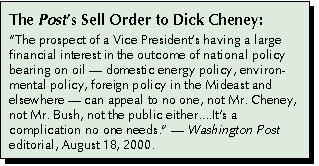 |
|||||||||
|
 |
||
|
 |
||||||||||||||||||||||||
|
||||||||||||||||||||||||
 |
||||||
|
||||||
 |
||||||
|
 |
||||||||||||||||||
|
||||||||||||||||||
 |
||||||||||||||||||||||||
|
||||||||||||||||||||||||
 |
||||||||||||||||||
|
||||||||||||||||||
|
|
|
For Immediate Release: Katie Wright (703) 683-5004 - Wednesday, July
17, 2002

Disgruntled White House Correspondent Washington Post's Bizarre Halliburton Spin Apparently, covering the White House isn't fun now that Bill Clinton is gone. "The White House's control over information for the past 18 months has generated a large amount of pent-up hostility in the press corps," the Washington Post's Dana Milbank wrote yesterday. Milbank anonymously quoted his Bush-bashing colleagues: "If they treat the press like the enemy, eventually we are," a "longtime White House reporter" confided. Milbank gravely noted that "turnover has been unusually high on the White House beat" since the GOP administration began. Never mind that the now-grumpy scribes were dazzled by Clinton's political skills each time he stonewalled Congress and lied to the press. Milbank's theory was that the Bushies have maintained such control that White House reporters feel marginalized, leading to "more contentious coverage of the administration" - as if more leaks would make a liberal press corps croon to Bush's more conservative tune. But whining about access is a thinly-veiled way to justify petulant stories such as another one Milbank produced for yesterday's Post - a front-page pastiche of insinuation and sarcasm directed at Dick Cheney, who was the CEO of Halliburton, an energy services firm, before he joined the Republican ticket two years ago as Bush's Vice President: "An executive sells shares in his energy company two months before the company announces unexpected bad news, and the stock price eventually tumbles to a quarter of the price at which the insider sold his," Milbank teased in his opening paragraph. "George W. Bush at Harken Energy Corp. in 1990? Yes, but also Richard B. Cheney at Halliburton Co. in 2000." (Milbank included no other information about Harken, such as the fact that the SEC cleared Bush of any wrongdoing.) "When Cheney left Halliburton in August 2000 to be Bush's running mate, the oil services firm was swelling with profits and approaching a two-year high in its stock price. Investors and the public (and possibly Cheney himself) did not know how sick the company really was, as became evident in the months after Cheney left," Milbank continued.
"Whether through serendipity or shrewdness, Cheney made an $18.5 million profit selling his shares for more than $52 each in August 2000; 60 days later, the company surprised investors with a warning that its engineering and construction business was doing much worse than expected, driving shares down 11 percent in one day," Milbank wrote. The theory that Cheney sold to avoid a price fall appears to be pure Milbank - the story includes no sources, named or unnamed, agreeing that Cheney's trades were suspicious. It's such an easily disproved charge, Post editors should have killed the story. Back in August 2000, in fact, both the Gore campaign and the media - including the Post itself - insisted that Cheney had an ethical duty to make a total financial break with Halliburton, even insisting that he forfeit millions of dollars in future stock options that he had rightfully earned (see box). Milbank both conceded and dismissed this point in the 13th paragraph of his story, after his baseless premise had been established: "Though Cheney was under pressure to sever his future financial interest in Halliburton, conflict of interest laws did not require the sale." Then why did Cheney face a total of 10 questions on when he would abandon his stock options from ABC's Sam Donaldson, CBS's Bob Schieffer, and NBC's Tim Russert when he navigated the Sunday talk show circuit on August 27, 2000? Does Milbank think reporters who couldn't tolerate his options would have yawned if the candidate had held on to all of his stock until after the election? Yesterday on MSNBC's Buchanan and Press, Milbank volunteered that he and the rest of the White House press corps were "fabulous whiners, we're world class whiners." With his anti-Cheney tale, he's shown how unhappy some reporters are with Bush's White House. -- Rich Noyes
Home | News Division
| Bozell Columns | CyberAlerts |








